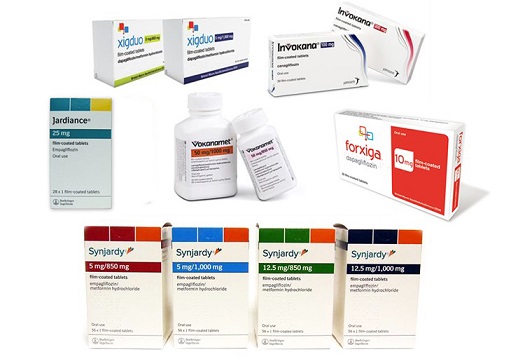Study Finds That Diabetics Taking SGLT-2i Drugs Like Canagliflozin, Dapagliflozin, And Empagliflozin Prior To COVID-19 Have Reduced Adverse Outcomes
Source: COVID-19 Drugs - Diabetics - SGLT-2 Inhibitors Dec 08, 2022 3 years, 2 months, 2 weeks, 1 day, 23 hours, 6 minutes ago
COVID-19 Drugs: A new study by researchers from Fujian Medical University -China, Fujian Provincial Hospital-China and Fujian Academy of Medical Sciences-China has found that diabetics taking SGLT-2i drugs like canagliflozin, dapagliflozin, and empagliflozin prior to contracting COVID-19 have reduced adverse outcomes.

SGLT2i or sodium-glucose cotransporter-2 inhibitors are a class of prescription medicines that are FDA-approved for use with diet and exercise to lower blood sugar in adults with type 2 diabetes.
The study which involved a network meta-analysis of 31 observational studies with more than 3.6 million patients found that sodium-glucose cotransporter-2 inhibitors were associated with lower risk of COVID-19–related adverse outcomes in diabetes, followed by glucagon-like peptide-1 receptor agonists and metformin, compared with insulin, dipeptidyl peptidase-4 inhibitors, secretagogues, and glucosidase inhibitors.
Typically, diabetic patients with COVID-19 have a high prevalence of disease severity and also increased risk of mortality. Diabetes and blood glucose control are determinants of intensive care unit admission and mortality.
The study team aimed to evaluate the association between COVID-19–related adverse outcomes and 8 antihyperglycemic drugs in patients with diabetes who were subsequently diagnosed and hospitalized with COVID-19.
Study data were retrieved and collected in PubMed, Embase, Cochrane Central Register, Web of Science, and ClinicalTrials.gov from database inception to September 5, 2022.
For this systematic review and network meta-analysis, randomized clinical trials and observational studies conducted among patients with diabetes while receiving glucose-lowering therapies for at least 14 days before the confirmation of COVID-19 infection were included after blinded review by 2 independent reviewers and consultations of disagreement by a third independent reviewer. Of 1802 studies initially identified, 31 observational studies met the criteria for further analysis.
The study followed the Preferred Reporting Items for Systematic Reviews and Meta-analyses reporting guideline. Bayesian network meta-analyses were performed with random effects. The key outcomes monitored were a composite adverse outcome, including the need for intensive care unit admission, invasive and noninvasive mechanical ventilation, or in-hospital death.
A total of thirty-one distinct observational studies (3 689 010 patients with diabetes hospitalized for COVID-19) were included.
Th study findings showed that sodium-glucose cotransporter-2 inhibitors (SGLT-2is) were associated with relatively lower risks of adverse outcomes compared with insulin (log of odds ratio [logOR], 0.91; 95% credible interval [CrI], 0.57-1.26), dipeptidyl peptidase-4 inhibitors (logOR, 0.61; 95% CrI, 0.28-0.93), secretagogues (logOR, 0.37; 95% CrI, 0.02-0.72), and glucosidase inhibitors (logOR, 0.50; 95% CrI, 0.00-1.01).
Based on the surface under the cumulative ranking curves value, SGLT-2is were associated with the lowest probability for adverse outcomes (6%), followed by glucagon-like peptide-1 receptor agonists (25%) and metformin (28%). A sensitivity analysis revealed that the study was reliable.
These study findings suggest that the use of an SGLT-2i before COVID-19 infection is associated with lo
wer COVID-19–related adverse outcomes. In addition to SGLT-2is, glucagon-like peptide-1 receptor agonists and metformin were also associated with relatively low risk of adverse outcomes.
The study findings were published in the peer reviewed journal: JAMA Network Open.
https://jamanetwork.com/journals/jamanetworkopen/fullarticle/2799219
The study findings of this meta-analysis provide information regarding routine antihyperglycemic medications and COVID-19–related adverse outcomes.
Dr Zheng Zhu, from the Shengli Clinical Medical College of Fujian Medical University in Fuzhou, China, and colleagues examined the association between COVID-19-related adverse outcomes and eight antihyperglycemic drugs in patients with diabetes subsequently diagnosed and hospitalized with COVID-19 in a review and meta-analysis. Data were included from 31 observational studies, with 3,689,010 patients with diabetes hospitalized for COVID-19.
The
COVID-19 Drugs study team found that compared with insulin, dipeptidyl peptidase-4 inhibitors, secretagogues, and glucosidase inhibitors, the SGLT-2is were associated with relatively lower risks for adverse outcomes (log of odds ratios [95 percent credible intervals], 0.91 [0.57 to 1.26], 0.61 [0.28 to 0.93], 0.37 [0.02 to 0.72], and 0.50 [0.00 to 1.01]).
SGLT-2is were associated with the lowest probability for adverse outcomes followed by glucagon-like peptide 1 receptor agonists and metformin based on the surface under the cumulative ranking curves value (6, 25, and 28 percent, respectively). The study was deemed reliable in a sensitivity analysis.
Dr Zhu told Thailand
Medical News, "Our study findings suggest that compared with other diabetes drugs, the use of SGLT-2is before COVID-19 infection in patients with diabetes was associated with a lower incidence of adverse outcomes after infection, which may be associated with improving blood glucose level, blood pressure, body weight, and lipid metabolism.”
Diabetics currently on other drugs should consult with their doctors about the suitability of switching to SGLT2i or sodium-glucose cotransporter-2 inhibitors and also metformin especially during this current ongoing COVID-19 pandemic.
For the latest on
COVID-19 Drugs, keep on logging to Thailand
Medical News.
